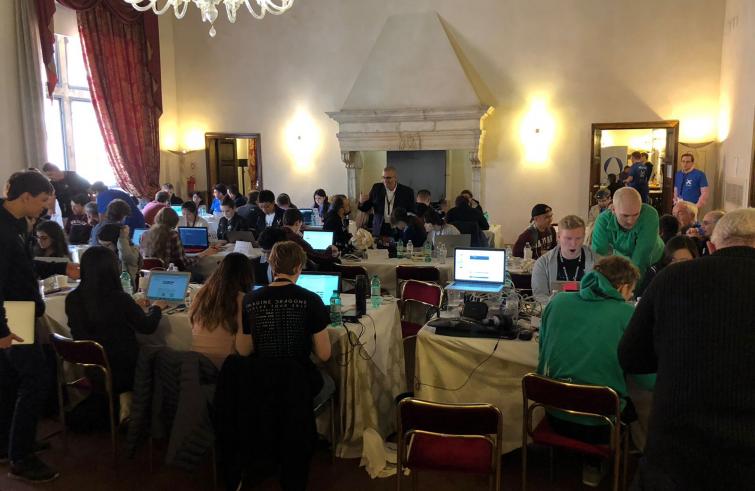
Talent, knowledge and the yearning to improve humanity. It’s the profile of 120 millennials (45% female, 55% male) from 60 universities worldwide, who participated in the first “Vatican Hackathon” challenge held a few days ago in the Vatican. Young people from 28 Countries took up the challenge of finding solutions to today’s major problems through technology. The three areas addressed were: “social inclusion”, “interreligious dialogue”, and “migrants and refugees.” “Millennials are a challenging reality”, said Msgr. Lucio Adrian Ruiz, Secretary of the Secretariat for Communications of the Holy See (SpC), that followed the “brains marathon” step by step and that will now be engaged in ensuring that the proposals find concrete application.
The experience in the Vatican last week can be summed up with the words conveyed by Pope Francis to participants in the first “Vatican Hackathon”: “it’s good to put the intelligence, which God gives us, at the service of truth and of the neediest.” Is that what happened?
It did. The initiative was a hackathon (a design sprint-like event for computer programmers and others involved in software development, including graphic designers, Ed.’s note) like many others organized by universities with the peculiarity that it was held in the Vatican and in other venues. We invited young participants to develop ideas at the service of the neediest.
The overarching goal was not confined to the presentation of technological tools, it encompassed support to those who suffer.
Which three words best describe the first “Vatican Hackathon”?
Intelligence, enthusiasm and creativity. Intelligence because participants were the world’s brightest students. They demonstrated their intelligence under many aspects, not only in the projects they developed but also in interpersonal relations, for example in difficulty management. To me it was important to see intelligence “in motion” in all its dimensions.
What impressed you the most in terms of their enthusiasm? All participants accepted the challenge of achieving the required objectives with the enthusiasm of someone who wants to create something to present to the Holy Father and say: “we contributed to the improvement of humanity”, with a drop that alleviates suffering. Some participants lived this experience with joy because they felt they were playing a role in a historical transformation. Their great enthusiasm is also visible in the fact that they prepared themselves for the event. Some of those who addressed the challenge of “migrants and refugees” had visited migrants and refugees in the places where they lived to identify these people’s major problems prior to the Vatican Hackathon. Thus their ideas were not abstract, they were linked to concrete situations. Youths in their twenties visiting refugees and migrants to ask about their problems: this means that they have taken the challenge seriously, that they have put their hearts into it.
What can you tell us about creativity?
They put it in practice in all the stages: first they identified the problems, then they made proposals choosing what they considered the most appropriate one and developed it with a “demo.” They were very creative also in the presentation of the project to convince us that their idea was a good one and it deserved being supported.
What happens next? All participants presented a prototype voted by a panel of judges. Partner companies of the event will finance the projects’ implementation. We’re now entering the most important phase of the “Vatican Hackathon”, the “follow up”.
Now the challenge begins: companies will support young people so that at least some of the best projects may be put into effect.
Many of them involve information technology systems or products, software whose success depends on two factors: they must be well-developed and be well-positioned in the institutional realities they cater to.
What will Pope Francis – who was informed on the “Vatican Hackathon” since its inception – be presented with?
When some of the projects will be put into action and provide an effective contribution we will show them to him. It will take time before the projects are developed, finalized and positioned. But only in this way will it be possible to initiate a veritable support-cycle that may last in time.
Now that the first “Vatican Hackathon” has ended are you planning to hold another one in the future?
Now the priority is the implementation of significant, useful projects. This will attract the attention of other companies and institutions, and young people will know that we fulfilled the dream of helping people in need. If what was proposed in the first Vatican Hackathon is not put into effect then it will remain a beautiful event, a show, but nothing more. We are considering the possibility of replicating this experience in a few years. In our hearts and minds we hope to hold a second “Vatican Hackathon”. This dream will come true only if we will be good at positively completing the first edition.
What will you cherish of this experience? I spent many hours with the young participants and I learnt a lot about their world: their mode of thought, what they feel, how they relate to others, how they communicate, their dreams… This relationship is a challenge for us and for the Church, to understand their culture. If we want to evangelize and communicate with this culture we need to know it.
The Millennials are a challenge to us. In the year of the Synod on Young People, the “Vatican Hackathon” was a beautiful opportunity to realize that we need to understand them:
more than a cultural adjustment, it’s a different culture that stands before us.














